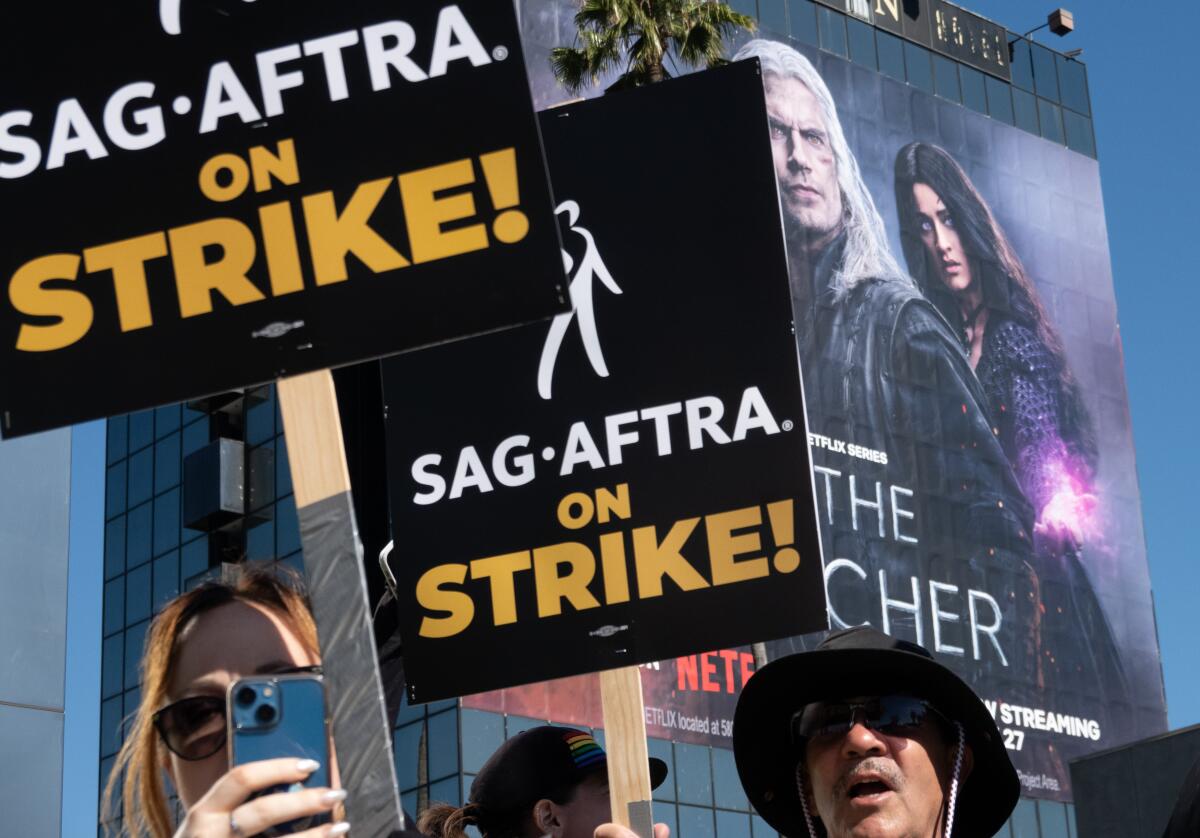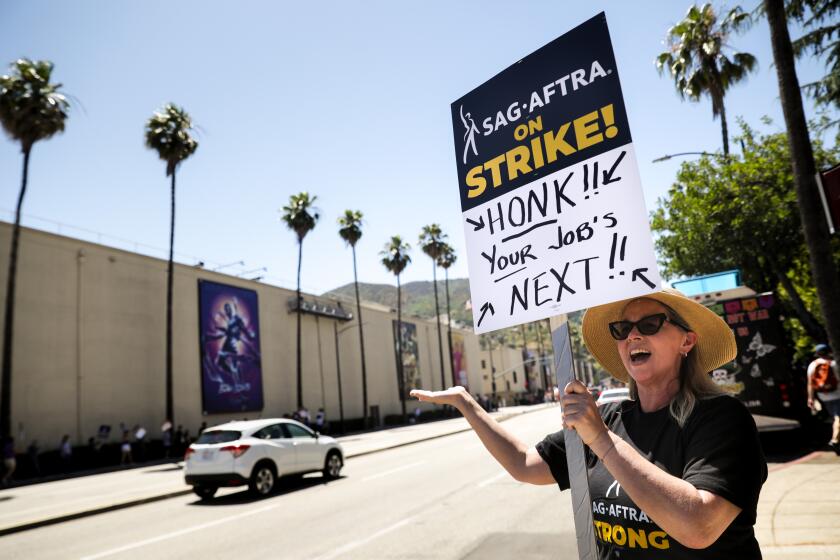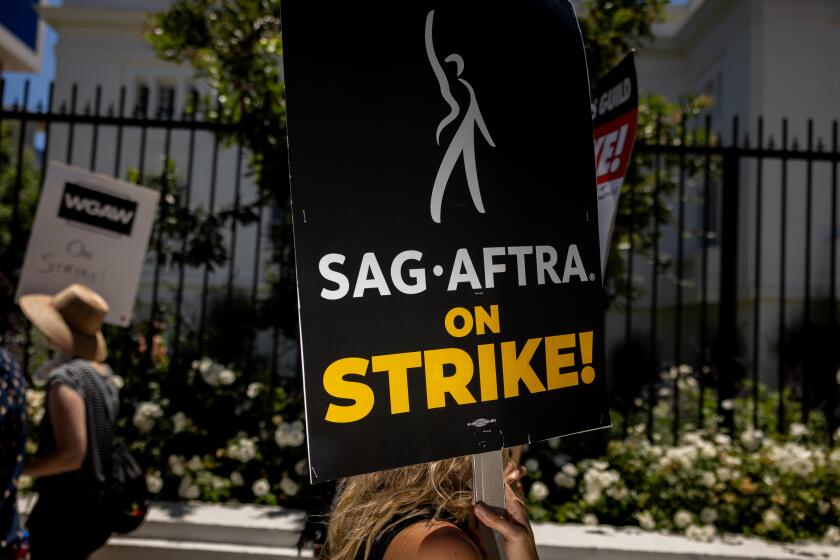How divided are SAG-AFTRA and the studios? Here’s what the two sides say

- Share via
SAG-AFTRA, the union representing Hollywood actors and other performers, has laid out its contract proposals — and what it said were the film and television studios’ responses — shedding more light on the impasse that led to its walkout last week.
In a message to its 160,000 members Monday, SAG-AFTRA accused the Alliance of Motion Picture and Television Producers of stonewalling and not engaging in talks over their most critical issues.
The guild also released a 12-page document with details illustrating, from its perspective, how far apart the two sides were when SAG-AFTRA began its historic strike, with actors joining writers in the first such simultaneous work stoppage in more than 60 years.
“We marched ahead because they intentionally dragged their feet,” the union said. “After we agreed to their compressed bargaining schedule, the AMPTP subjected us to repeated stonewalling and delays.”
The studio alliance said SAG-AFTRA’s news release mischaracterized the negotiations and was an attempt to “deliberately distort” the studios’ offers.
“The deal that SAG-AFTRA walked away from on July 12 is worth more than $1 billion in wage increases, pension & health contributions and residual increases and includes first-of-their-kind protections over its three-year term, including expressly with respect to AI,” AMPTP said. “For SAG-AFTRA to assert that we have not been responsive to the needs of its membership is disingenuous at best.”
The heated back-and-forth, which mirrors the war of words during the early days of the writers’ strike, gives a sense of how much work will have to be done to reach a deal once the union and the studios return to the negotiating table.
Inside the business of entertainment
The Wide Shot brings you news, analysis and insights on everything from streaming wars to production — and what it all means for the future.
You may occasionally receive promotional content from the Los Angeles Times.
SAG-AFTRA hit the picket lines on Friday, joining Writers Guild of America members who’ve been striking since May 2, adding momentum to the labor movement.
The dual strike is a major blow to the entertainment industry, hobbling TV and film production at a time when studios and media companies are dealing with the transition to streaming, a recovering box office and accelerating declines in pay-TV subscriptions.
The union said it asked for general wage increases of 11%, then 4% and 4%, over the three-year contract, and that the studios offered 5%, 4% and 3.5%. The union said that, with inflation, the studios’ offer would be equivalent to members working for less than 2020 wages in 2026.
AI technology, which is developing rapidly and is seen by many labor groups as a threat, emerged as another major sticking point.
SAG-AFTRA said it proposed a “comprehensive set of provisions” for consent and compensation when a so-called digital replica of a performer is made or if their performance is changed using artificial intelligence.
The union said the studios’ AI proposal would allow them to scan a background performer’s image for half a day’s pay and use it in perpetuity without the performer’s consent. The studios also wanted to be able to make changes to performers’ dialogue without consent, according to SAG-AFTRA.
The AMPTP has disputed SAG-AFTRA’s characterization of its offer, calling it “false” and saying that background actors would be given consent over the use of their digital likenesses.
Other proposals where the sides remain split were meant to address the ways streaming services have roiled the industry with changing business practices.
For example, the union said it proposed a revenue-sharing plan for shows and films on streaming platforms, which would allow actors to participate in the success of big online hits, but that the studios rejected this without a counteroffer. SAG-AFTRA did not disclose the details of its revenue-sharing proposal.
Additional union proposals were met with inadequate responses, SAG-AFTRA said, including on one issue related to race and equity.
The guild said it asked for a requirement that all sets have qualified hair and makeup professionals and equipment for actors of color. According to SAG-AFTRA’s document, the studios tentatively committed to taking steps to ensure the appropriate qualified hair and makeup professionals are on set, but only for principal performers, not background actors.
SAG-AFTRA said the studios offered insufficient increases for caps on health and pension plan contributions. The union said the studios also fell short of its demand to increase allowances to cover out-of-state and overseas relocation costs for television series regulars.
The document noted some areas of agreement, such as a travel benefit to provide access to reproductive healthcare and gender-affirming care to performers working in states that restrict such care; and protections against stunt performers being painted to match the skin color of the main actor. There was agreement over safety for performers working with animals on set.
Actors are striking against the major Hollywood studios for the first time in 43 years. Here’s what to know.
But it’s clear the sides remain divided on key issues, and there’s no indication yet of when talks will resume to resolve either the actors’ or the writers’ strike.
The AMPTP last week blamed the performers’ union for walking away from negotiations and released a document listing bullet points of multiple offers it had made to improve compensation, including wages and residuals.
The studio group said it had offered the highest percentage increase in minimums in 35 years; a 76% increase in high budget streaming video on demand foreign residuals; “substantial” increases in pension and health contribution caps; as well as what it described as a “groundbreaking” proposal on artificial intelligence.
The alliance also said it offered a 58% increase in salaries for major role (guest star) performers on high-budget streaming programs, and made a proposal to limit demands on actors to self-tape auditions.
SAG-AFTRA has approved a deal from the studios to end its historic strike. The actors were on strike for more than 100 days.
The two sides were unable to come to an agreement despite the intervention of a federal mediator. The two sides had been in talks since June 7 and already extended an original deadline of June 30 to July 12.
Before talks started, SAG-AFTRA members last month voted 98% in favor of authorizing their leaders to call a strike if they couldn’t reach a deal on a new contract.
More to Read
Inside the business of entertainment
The Wide Shot brings you news, analysis and insights on everything from streaming wars to production — and what it all means for the future.
You may occasionally receive promotional content from the Los Angeles Times.













